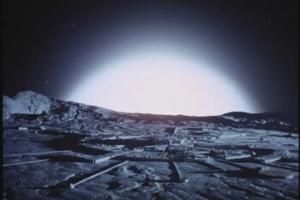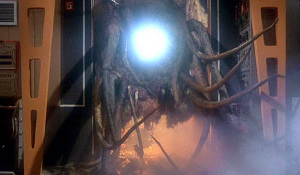Spawn of Mars
Blog of Fictioneer David Skinner
A Happy Year, IndeedNews of Story Submissions
Sunday, December 1, 2019 5:10 pm
Cirsova Magazine has accepted my outstanding story The Fourth Gift, which will appear in the 2020 Summer Special. I really wanted to get into Cirsova, just as I wanted to get into StoryHack and Stupefying Stories. Hurrah!
With this, I have sold every story I have written since I retired from my day job three years ago. Yes, that is only seven stories; but none of them will die in my drawer, unread. And considering that I sold zero stories in all the years before 2017, those seven will do nicely. (To be sure I had some success with juvenile books in the 1990s; but only now are my grown-up stories succeeding.)
Now to finish An Uncommon Day at the Lake (the 3rd Hamlin Becker tale). And after that? I have some ideas...
Nightmares and LonelinessThe True Nature of Space: 1999
Sunday, December 1, 2019 1:25 pm
The first part of this was posted on September 13th. I decided to combine the two parts into a single post. I also changed the title.My father and I didn't do a lot together. In part he was simply seldom around. He was in the restaurant business — as cook, as manager, as owner — and the hours were atrocious. He was also not given to
fraternizing with his children.
In fairness to him, I was a difficult and solitary nerd.
Once, in the late 1970s, he took me to a signing with several SF authors. He had no taste for SF. He did this for me. Anyhow, I didn't know who would be there. As it was, I had read none of them. I think one was Frederik Pohl. Another was Ben Bova. Somehow I (and my father) ended up hanging around Bova — probably because he was the only one I really knew, since he had been Editor of Analog, to which I subscribed.
I remember only one thing that Bova said. An attending nerd (not I) brought up Space: 1999. Bova recounted some conversation he'd had with Isaac Asimov about that very subject. Seems that neither Bova nor Asimov cared much for Space: 1999. Bova's contempt was rather clear.
I loved Space: 1999. I was just a teenage boy, self-conscious beyond measure; and already disappointed by the lack of my favorite authors at this little signing, I was... well, hurt. I didn't get indignant. I didn't get angry. I was stung. And it hurt as well because Bova wasn't wrong. Space: 1999, while not contemptible, is a little bad; and I knew so even then.
I think at that point my father was waiting in the car. I hung out a while longer. Then, having half-heartedly obtained an autograph from Bova, I left. I'm grateful my father took me. But it's a melancholy memory.
Today is the 20th anniversary of the day that the denizens of Moonbase Alpha were cast into the cosmos. On September 13th, 1999, concentrated nuclear explosions on the farside of the Moon propelled the Moon out of orbit. The Alphans, unable to return to Earth, found themselves adrift on an uncontrollable Moon. They left our Solar System far behind, on a path towards — adventure!
Well, of course it's preposterous. I'm not going to go over all the stupid that is required for Space: 1999 to work. It can't work. Science is ashamed of Space: 1999. And of course you know what I'm going to say.
Who cares.
You must recognize how simply magical the premise is. We're not dealing with the plausible. Yes, the creators thought they were writing Real Science Fiction. But they were hacks; a bunch of Ed Woods. They had a cool idea and they ran with it. Because it is a cool idea. An awesome idea. You know it is. The wonder of traveling to the stars on the Moon!
You must also recognize that Space: 1999 is not Star Trek or Star Wars or Stargate. It is not an adventure show.
It is a Nightmare.
This crystallized for me only tonight. I'm embarrassed that I never had this insight. All the pieces were already there; yet only tonight did the epiphany come. I was listening to a livestream hosted by Doomcock (whose nom de YouTube is Overlord DVD). Doomcock, in honor of the date, was chatting a bit about Space: 1999. He asserted that Space: 1999 is not SF but HORROR. He really didn't elaborate a lot. He didn't have to. I knew instantly what he meant; and instantly I understood why I like Space: 1999, why it isn't complete trash, and why, despite everything, it can kind of work.
Part II
In many ways I was a conventional boy. I climbed trees. I raced bikes. I played ball with neighborhood kids. I built models of trucks and airplanes. I walked daringly through spillways and foolishly across the weirs of nearby rivers.
But I was also subtly peculiar. My sense of human relations was misaligned. This only worsened as my family, moving house constantly, refused to stay rooted, and I was always starting over with knowing people. I didn't cease to be social, as such; but I began my lifelong loneliness.
The odd thing about being lonely is that it's not necessarily a feeling you try to flee. Things suffused with loneliness do not repel me. They allure me.
And so here you have a science fiction show set on the Moon — the grey and lifeless Moon, whose settlers are not vivaciously dispersed beneath the sky but are packed away, contained in rooms and corridors and bound by vacuum; fellows in a harsh solitude, made harsher by their catastrophic expulsion from the hearth of Earth.
Loneliness pervades the show.
Do these lonely travelers come upon exotic wonders? Not exactly. Each planet they encounter is a chance to escape, not into diversion but into a home. And they are always frustrated. Sometimes the planet itself is hostile; sometimes the existing inhabitants are. In one episode aliens send terraforming equipment to the Moon precisely to dissuade the Alphans from attempting any contact. It seems the Moon could be home after all! Yet as soon as the Moon has spun beyond the alien world, the equipment is withdrawn and the Moon reverts.
Another time the Moon becomes a forward base for one side in an interplanetary war. Alpha is caught up in the fighting. Then the Moon passes on. Again the Alphans have been simply beset and returned to the void.
A couple of episodes (especially The Testament of Arkadia) hint that the journey of the Moon might be more than a mishap; that the Alphans may have an awful destiny and their trials may be other than pointless.
But no end is ever seen.
When the first child is born on Alpha — what greater hope is there than a child! — he is bodily hijacked by a violent being who seeks to end its own exile. And though the being is defeated and the child is restored, the lesson seems clear: The wandering Moon is no place for hope.
For even a child becomes a terror; a monster. The show does not deal in the merely alien. In its loneliness it proceeds, like a solitary sleeper, from nightmare to nightmare: The Troubled Spirit; Death's Other Dominion; End of Eternity; Guardian of Piri; Force of Life...
The epitome of this is Dragon's Domain, one of my favorite episodes.
Back in 1996, the crew of the Ultra Probe was killed by a monster. The commander, Tony Cellini, survived and returned to Earth. No one believed him, of course. He resumed service on Moonbase Alpha. And now, three years into the Moon's journey, Cellini starts to unravel. He senses the monster. Sure enough, the Moon has crossed paths with the graveyard of spaceships that includes the Ultra Probe.
The monster is not a guy in a rubber suit. True, it's obviously a practical effect; and one can discern the rubber in it. Space: 1999 was not a big-budget affair. And yet it's a proper monster, if not scary then surely creepy. It's a Cthulhu thing with an oven for a mouth. The show played it as horror. It came off as horror.
And that's kind of my point about Space: 1999. Another show would have played it for thrills or awe or heroic adventure. Instead we get moody, gloomy, creepy. They even use Albinoni's Adagio to set the tone.
Is Dragon's Domain a master class in television? Hardly. Like every other episode of Space: 1999, the stupid abounds. The acting embarrasses.
But. That tone. It's real. It's what elevates the show — at least enough. And you can know it is very real because the second season deliberately fled the gloom and sought excitement. And that second season, lacking nightmares and loneliness, is garbage. Even when I was thirteen I hated it.
That first season, though? In a culture that has managed to create Firefly and The Expanse, it is hard to praise, let alone recommend, a thing like Space: 1999. I will, however, defend it. It has an allure. Perhaps that's only the nostalgia talking; but for a lonely boy in 1975, Space: 1999 was amazing — and I can't disagree with that boy.
Christmas Greetings from People I Don't KnowAntique Postcards, a Century On
Saturday, November 30, 2019 5:56 pm
As I mentioned in a
post in 2017, for Christmas I decorate my mantle with antique postcards. I bought these from boxes in antique shops. Since it is now
properly after Thanksgiving, I have now placed my Christmas decorations; and for fun I present to you a couple of those postcards.
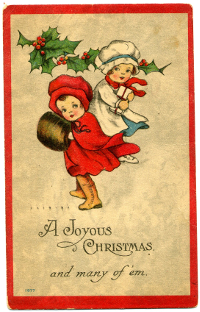 | 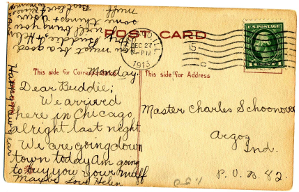 |
Postmarked December 27, 1915
Master Charles Schoonover, Argosy, Ind., P.O.B. 82.
Dear Buddie; We arrived here in Chicago alright last night. We are going down town today[.] Am going to buy you your muff[.] Maybe[.] Love Helen
Happy New Year
You must be a good boy Buddie, + Helen will bring you some things + your muff. Best Love + Kisses to Mama + Papa |
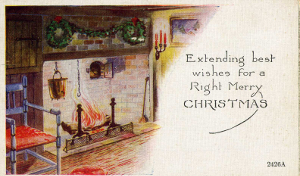 | 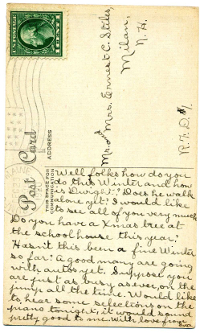 |
Postmarked December 23, 1920
Mr. and Mrs. Ernest C. Stiles, Milan, N.H. R.F.D. #1
Well folks how do you do this Winter and how is Dwight? Does he walk alone yet? I would like to see all of you very much[.] Do you have a Xmas tree at the school house this year? Hasn't this been a fine Winter so far? A good many are going with autos yet. Suppose you are just as busy as ever, on the jump all the time. Would like to hear some selections on the piano tonight, it would sound pretty good to me. With love from Ina |
It's amusing how Helen is focused on a muff for Buddie. A muff she may or may not purchase! Was Helen Buddie's big sister? An aunt?
Ina has more to say than Helen. I'm not sure what she means by "A good many are going with autos yet." I think I'm missing a meaning of "yet." Is she saying that a lot of people are driving cars? Or not driving, because of the winter weather? I really like the phrase "on the jump all the time." Ina's thoughts are appropriately scattered for a missive on a postcard. I'd like to hear some selections on a piano myself; and I enjoy the image of little Dwight walking alone at last.
Planetary Pluto Is OutRead My Story in It!
Friday, November 29, 2019 4:33 pm
After an unfortunate delay (which even included a change in publisher), the Pluto anthology is finally out.
Buy it on Amazon (to give me and the publisher money). Review it on Amazon (to increase its rank). Read my story
Ambit of Charon and be amazed by my geniusness.
Go, now!P.S. Sadly there's a "typesetting" problem, in that all my italics are shown as underlines. This was caught in proof but not corrected. A proper version should come out someday, but over that I have no control. For now please infer italics.
P.P.S. Update 7/24/22. The anthology is now out of print, but my story is available in my collection
Stellar Stories, Vol. 1.
Claire Randall Is a Trollop and a ShrewAnd Outlander Cheers, "You Go Girl!"
Tuesday, November 5, 2019 11:02 am
Outlander is a TV series about Claire Randall, former war nurse, who is living in Britain in 1946 when she is magically transported to the Scottish Highlands of 1743.
Outlander supposes Claire to be our heroine. But Claire is
not a heroine; and there are three things that confirm this.
Note as a preliminary that, thinking herself trapped in 1743, Claire consents to marry the sexy Scotsman Jamie, even though, back in 1946, she is already married to bookish Frank. This bigamy is not in itself the problem. There are good narrative reasons for it.
First Thing. Jamie and party are off to find a British deserter. Claire has come along because she has demonstrated (with her superior 20th-century learning) her utility as a nurse. But fearing a trap, Jamie tells Claire to hang back. He wants her safe. She promises to stay put. Once he is gone, she wanders off. She is captured by the British. Jamie and party rescue her. Once rescued, she is upbraided by Jamie for wandering off. She endangered everyone. The clan has now exposed itself to British retribution. The British commander has learned that Jamie, who is a fugitive, is hiding amongst that clan. Jamie is furious with Claire for disobeying him and breaking her promise. And what does she do? She rants about not being his property; that he can't order her around. Claire is a Strong Woman, after all. No husband, no man, can dictate to her!
Now, Claire wandered off because she sensed Craigh na Dun nearby. The standing stones of Craigh na Dun were the point of her transition to 1743 — and she wants to transit back to 1946. In other words, her reasons for disobeying Jamie were profound. Yet, instead of getting an honest character conflict (wherein Claire recognizes the enormity of her disobedience but cannot admit the time-displacement thing), we get that shrewish feminist cry "I AM NOT YOUR PROPERTY!" — as if heeding Jamie's solicitous authority and keeping her promise are equivalent to chattel enslavement. Her response is unbecoming and adolescent — as feminism be — and, what's worse, Outlander believes Claire has responded appropriately to Jamie's fury.
Second Thing. Claire has made friends with Geillis, a sassy woman who dabbles in potions and is married to a flatulent buffoon. Geillis, wanting to be with her lover, poisons her husband. Jamie tells Claire to stay away from Geillis, given the murder, the scandal, the danger from the law, and other such petty things. Again Claire promises to stay put. Then Claire gets a note from Geillis and immediately goes to see her. Does Claire ever once shrink from Geillis the murderess, the poisoner of husbands? Does she tell Geillis that maybe poisoning was a bad idea? No. Claire is only concerned for her friend. Screw the men, after all. What matters most is the happiness of Geillis, who is Claire's bestest bestie.
Outlander has no problem with Claire's myopic behavior. The sisterhood is what matters, right through the inevitable trial for witchcraft (and its attendant Christophobia).
Third Thing. Jamie, having learned that Claire is from 1946, nobly takes her to Craigh na Dun so that she might return home and reunite with Frank. At this point Jamie and Claire are in full-on monkey-sex love. As she approaches the stones it is clear that she can indeed return; the forces are calling her through. Frank, of course, is desperately unhappy in her absence; and although she can't know this, what else would he be? He's also just her husband, her proper husband, her original husband. She has some vows to uphold, I'd say. However, she stays in 1743 because, of course, it's Sexy Highlander she wants inside her.
And Outlander tells you: It's so romantic!
These three things were so off-putting that I could not accept Claire as a heroine. I kept waiting for Outlander to be honest about Claire. It never was. So never mind.
Outlander is a highbrow Harlequin Romance. It is a bodice-ripping woman's fantasy and Claire Randall is the avatar of irresponsible feminine self-centeredness.
I've got better things to watch.
A Mostly Happy YearNews of Story Submissions
Monday, September 23, 2019 12:06 pm
I submitted three stories to
Stupefying Stories. Two were accepted. Weirdly I was more affected by the third being rejected. I am not a half-full kind of guy. Still, it was surely great to have
two accepted.
So the story situation is as follows.
Ambit of Charon. This is my story in the Pluto anthology. The anthology is supposedly still happening. At this point I don't believe it will ever happen. Superversive Press seems lost. One can hope, however.
Due a Hanging. This is my second Hamlin Becker story. It will be coming out (before February) in StoryHack #6.
Banana Man and Wayward Scarecrow. These are the two accepted by Stupefying. I don't know when they will come out, but I presume it will be in the coming year.
The Fourth Gift. This is the one rejected by Stupefying. It was also rejected by Superversive (from their Luna anthology, for which it was written). Indeed, this poor story has been rejected repeatedly this year. I've been submitting it, scattershot, with little concern about whether it would "fit in" (apart from targeting SF and Fantasy mags). It's actually a great story. Really. Just this morning I threw it at another mag that is sure to reject it. But hey, you never know.
That's all. If I were trying to make a living at this writing nonsense, I would be entirely impoverished. But I'm just writing to write (and to avoid squandering what talents I have). If I get published — hooray! If not — oh well.
But in fairness to the Great Balance, I concede that the news has been enough for me to declare this year to be Mostly Happy, so far as writing goes.
P.S. I have made good if unremarkable progress on my third Hamlin Becker story. I should finish it this year, in time to submit to StoryHack.
Perfect MelancholyAn Instrumental That Shouldn't Be Lost
Saturday, September 21, 2019 11:07 pm
I was in the open beta for
WildStar, an SF MMO, back in 2014. I then subscribed for three months. The game had lots of
good in it; but it didn't hold me. Something fundamental was missing. And it was stupid hard. You really couldn't just log in and have fun. And the game's population collapsed so quickly that the open regions were always barren. I was alone in an MMO.
In any event, the music was part of its goodness. There was a piece that looped in your in-game house. It was beautiful. I made a point of returning to my house at the end of every session, in part to roleplay slightly, but mostly so that I could take my character home, tuck her into bed, and linger.
I found the piece on YouTube. It's called "Plotting Our Course." Do listen to it. It's so pretty. The melancholy is perfect. The composer made something wonderful — yet it was merely incidental music in a failed videogame. Who will remember it? Though it is not lost, it seems so precariously preserved.
And I think again of the status of art at the consummation of the world. In a post of mine from 2017, Superfluous in Heaven, I supposed that art (specifically music) might be pointless in the afterlife; and yet I hoped that it would be retained somehow. Will all mankind, newly resurrected, learn of every achievement of beauty, even the most minor? If a thing is genuinely beautiful, wouldn't God value it, too?
Will man's creations be not abandoned?
To be sure, it's hard to imagine God preserving Saw III or Big Mouth. Nothing would be in Heaven that God did not love; and God cannot love what is ugly. But what of MacBeth? Or The Big Sleep? Or Taxi Driver? Where is the line between being ugly and portraying ugliness? Do we value things that God cannot? Is our valuation so corrupted? Or does God love Breaking Bad as much as any right-thinking human?
I don't know. All I know is that WildStar contained a bit of art utterly without ugliness and I'd like that bit to endure.
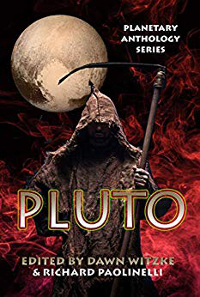

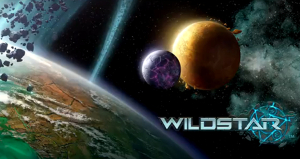 I was in the open beta for WildStar, an SF MMO, back in 2014. I then subscribed for three months. The game had lots of good in it; but it didn't hold me. Something fundamental was missing. And it was stupid hard. You really couldn't just log in and have fun. And the game's population collapsed so quickly that the open regions were always barren. I was alone in an MMO.
I was in the open beta for WildStar, an SF MMO, back in 2014. I then subscribed for three months. The game had lots of good in it; but it didn't hold me. Something fundamental was missing. And it was stupid hard. You really couldn't just log in and have fun. And the game's population collapsed so quickly that the open regions were always barren. I was alone in an MMO. 
